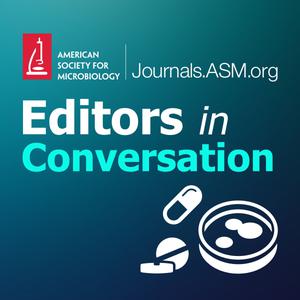
Editors in Conversation
American Society for Microbiology
- 37 minutes 38 seconds10 Years of Rhodococcus: Clinical Trends and Susceptibility Profiles
Rhodococcus infections are uncommon, however they can cause serious disease in certain patients. There are a number of challenges though when dealing with Rhodococcus infections, including the fact that much of what we know around their susceptibility profiles and the clinical management of infected individuals actually comes from a number case series and in some situations, from the veterinary literature. So today, our two guests are going to tell us about their experiences with Rhodococcus over a 10-year period and bring us up-to-speed on things like:
- Which species of Rhodococcus are most commonly isolated and associated with clinical disease
- What is the recommended approach to susceptibility testing for Rhodococcus and what sorts of susceptibility trends do we see at both the genus and species levels
- And also, of course, we’re going to talk about the clinical manifestations and outcomes of clinically significant Rhodococcus infections
- Adi S. Shah, M.B.B.S., Mayo Clinic
- Nancy L. Wengenack, Ph.D., Mayo Clinic
Rhodococcus infection: a 10-year retrospective analysis of clinical experience and antimicrobial susceptibility profile | Journal of Clinical Microbiology This episode of Editors in Conversation is brought to you by the Journal of Clinical Microbiology and hosted by JCM Editor in Chief, Alex McAdam and Dr. Elli Theel. JCM is available at https://jcm.asm.org and on https://twitter.com/JClinMicro. Visit journals.asm.org/journal/jcm to read articles and/or submit a manuscript.
19 April 2024, 10:11 pm - 37 minutes 32 secondsWhy Phage Therapy May Fail
Phage therapy has gained a lot of traction but the challenges created by this approach have not been properly assessed at a big scale. We often read about therapy successes on isolated cases but, rarely, we read or hear about failures. AAC recently published a case series of patients who failed phage therapy. Today, we will discuss this topic with the principal investigator on the research.
Topics discussed:- Phage therapy as an approach for MDR bacteria.
- The challenges of phage therapies.
- Issues that can influence the success of phage therapy
- Saima Aslam, MBBS. Director, Solid Organ Transplant Infectious Diseases Service, Professor of Medicine, University of California, San Diego.
Pseudomonas aeruginosa ventricular assist device infections: findings from ineffective phage therapies in five cases https://journals.asm.org/doi/10.1128/aac.01728-23
Questions Answered:- How are we doing with phage therapy at this point?
- What are the challenges to deploy phage therapy in clinical settings?
- The 5 cases of failure of phage therapy in patients with LVADs summarized
- What factors did Dr. Aslam identify that were related with the failure?
- How do you develop neutralization against phages and how can you prevent it?
- Bacterial isolates with varying phage susceptibility, how can this be detected?
- What did Dr. Aslam learn?
- Future research
This episode is brought to you by the Antimicrobial Agents and Chemotherapy journal available at aac.asm.org. If you plan to publish in AAC, ASM Members get up to 50% off publishing fees. Visit asm.org/membership to sign up.
Visit journals.asm.org/journal/aac to browse issues and/or submit a manuscript.
5 April 2024, 9:55 pm - 34 minutes 33 secondsIs Lophomonas a Pathogen?
The protozoan Lophomonas has been reported to be a pathogen of humans in a large number of case reports and case series. Most of these case reports describe infections of the respiratory tract. Editors in Conversation is joined by two experts to discuss this possible parasite. Some of the questions addressed include:
- What are the characteristics of the species in the genus Lophomonas?
- What are the laboratory and morphological data that suggest that Lophomonas species cause human infections?
- What are the purported clinical manifestations of Lophomonas?
- Finally, is Lophomonas truly a pathogen of humans?
- Dr. Abhishek Mewara - Additional Professor in the Department of Medical Parasitology at the Postgraduate Institute of Medical Education and Research in Chandigarh, India.
- Dr. Bobbi Pritt - Chair of the Division of Clinical Microbiology and Professor of Laboratory Medicine and Pathology at Mayo Clinic.
“Lophomonas as a respiratory pathogen—jumping the gun,” by Abhishek Mewara, Gillian H. Gile, Blaine Mathison, Huan Zhao, Bobbi Pritt, and Richard S. Bradbury (https://journals.asm.org/doi/10.1128/jcm.00845-23).
This episode of Editors in Conversation is brought to you by the Journal of Clinical Microbiology and hosted by JCM Editor in Chief, Alex McAdam and Dr. Elli Theel. JCM is available at https://jcm.asm.org and on https://twitter.com/JClinMicro.
Visit journals.asm.org/journal/jcm to read articles and/or submit a manuscript.
23 February 2024, 9:48 pm - 40 minutes 17 secondsTreatment of Multidrug-resistant Tuberculosis
Tuberculosis is one of the most deadly infectious diseases that still causes significant burden of disease, particularly in the developing world. The emergence of resistance to first line agents severely limits the therapeutic options and threaten the ability to control dissemination of this disease. Fortunately, new drugs and regimens are now emerging as important alternatives against these organisms. Today, we will discuss this topic with outstanding experts in the field. Welcome to the editors in conversation.
Topics discussed:- The burden of multidrug-resistant TB.
- New drugs and regimens for MDR TB.
- The current and future pipeline for TB
- Kelly Dooley, MD Ph.D. Professor and Addison B. Scoville, Jr., Chair in Medicine, Director, Division of Infectious Diseases, Department of Medicine, Vanderbilt University Medical Center. Past Editor of AAC
- Sean Wasserman, MD Ph.D, Reader in Infectious Diseases at St Georges University of London and Associate Professor in the Division of Infectious Diseases and HIV Medicine at University of Cape Town, SA. Editor of AAC.
This episode is brought to you by the Antimicrobial Agents and Chemotherapy journal available at aac.asm.org. If you plan to publish in AAC, ASM Members get up to 50% off publishing fees. Visit asm.org/membership to sign up.
Visit journals.asm.org/journal/aac to browse issues and/or submit a manuscript.
Subscribe to Editors in Conversation (free) on Apple Podcasts, Google Podcasts, Android, Spotify, Email.
9 February 2024, 10:55 pm - 47 minutes 47 secondsNew generation B-lactam/B-lactamase inhibitors: Taniborbactam
A new generation of B-lactamase inhibitors is likely to reach the market in the upcoming year. These broad-spectrum inhibitors exhibit activity against the most feared class B metallo-B-lactamases maintaining the inhibition of other enzymes. Recently AAC has published three papers that describe the mechanistic bases of taniborbactam resistance among metallo-enzymes. This knowledge is crucial to understand the limitation of these compounds in clinical practice. Today, we will discuss this topic with some of the authors of the mentioned papers. Welcome to the editors in conversation.
Topics discussed:- The activity and chemical basis of new generation B-lactamase inhibitors with activity against metallo-B-lactamases.
- Taniborbactam as an example of novel B-lactam, B-lactam inhibitors
- Mechanisms of resistance to taniborbactam and other inhibitors
- Robert Bonomo, MD. Director of the VA CARES Center and Distinguished Professor at Case Western Reserve University (CWRU) School of Medicine. Past Editor of AAC
- Pranita Tamma, MD MPH. Associate Professor of Pediatrics, Johns Hopkins School of Medicine, Editor of AAC
- Alejandro Vila, PhD Professor of Biophysics, Instituto de Biologia Molecular y Celular de Rosario, CONICET - Universidad Nacional de Rosario, Rosario, Argentina
This episode of Editors in Conversation is brought to you by the Antimicrobial Agents and Chemotherapy Journal and hosted by AAC Editor in Chief, Cesar Arias.
AAC is available at https://asm.org/aac.
Follow Cesar on twitter at https://twitter.com/SuperBugDoc for AAC updates.
Subscribe to the podcast at https://asm.org/eic
13 January 2024, 3:46 am - 1 hour 5 minutesFavorite Clinical Microbiology Papers of 2023 (JCM ed.)
We managed to make it through 2023 without a major epidemic or pandemic, and as we get into the holiday spirit and look forward to the new year, some of us took a look back and picked out one of our favorite JCM paper published in 2023, which I will tell you, was no easy task as there were many of good ones to choose from! And personally, after looking through all the issues over the last year, it never ceases to amaze me the variety of topics that we publish on in JCM – including unique things like the evaluation of a molecular assay for diagnosis of Buruli ulcers, to development of an EIA for detection of Taenia coproantigen, and then of course we have the more bread and butter things like evaluation of new assays for detection of TB resistance, to multiple studies this year on women’s health diagnostics, and evaluation of new molecular assays for congenital CMV detection, and then I’m also told that there were some awesome AST-focused papers too, which is all just great. The four of us JCM editors have selected the following favorite papers of ours from the past year:
- Whole-Genome Subtyping Reveals Population Structure and Host Adaptation of Salmonella Typhimurium from Wild Birds | Journal of Clinical Microbiology (asm.org)
- Detailed β-(1→3)-D-glucan and mannan antigen kinetics in patients with candidemia | Journal of Clinical Microbiology (asm.org)
- Interlaboratory comparison of Pseudomonas aeruginosa phage susceptibility testing | Journal of Clinical Microbiology (asm.org)
- Emergence of Inducible Macrolide Resistance in Mycobacterium chelonae Due to Broad-Host-Range Plasmid and Chromosomal Variants of the Novel 23S rRNA Methylase Gene, erm(55) | Journal of Clinical Microbiology
- Commentary: Plasmid-mediated drug resistance in mycobacteria: the tip of the iceberg? | Journal of Clinical Microbiology
- Melissa Miller, Ph.D., D(ABMM), FAAM, University of North Carolina Medical Center
- Patricia Simner, Ph.D., D(ABMM), Johns Hopkins University School of Medicine
This episode of Editors in Conversation is brought to you by the Journal of Clinical Microbiology and hosted by JCM Editor in Chief, Alex McAdam and Dr. Elli Theel. JCM is available at https://jcm.asm.org and on https://twitter.com/JClinMicro.
Visit journals.asm.org/journal/jcm to read articles and/or submit a manuscript.
23 December 2023, 12:32 am - 28 minutes 14 secondsAntimicrobial Resistance in Neisseria Gonorrhoeae (JCM ed.)
Gonorrhea remains one of the more common sexually transmitted infections. In North America, the number of reported cases has generally risen for over ten years, with interruptions in the early days of the COVID-19 pandemic, followed by returns to rising rates of infection. Under the selective pressure of antimicrobial treatment, antimicrobial resistance has risen, which has led to limited options for treatment Today, we will be discussing antimicrobial resistance in N. gonorrhoeae, including these questions: • How accurate is gradient diffusion susceptibility testing when compared to agar-dilution results? • Should we use analysis of whole genome sequencing results or agar dilution phenotypic results as the gold-standard for antibiotic susceptibility testing of N. gonorrhoeae? • What is the utility of beta-lactamase testing for predicting penicillin susceptibility results in N. gonorrhoeae?
Guests:- Dr. Tanis Dingle, Clinical Microbiologist at Alberta Precision Laboratories and a Clinical Associate Professor in the Department of Pathology and Laboratory Medicine at the University of Calgary.
- Dr. Angela Ma., Clinical Microbiologist at Public Health Ontario.
This episode of Editors in Conversation is brought to you by the Journal of Clinical Microbiology and hosted by JCM Editor in Chief, Alex McAdam and Dr. Elli Theel. JCM is available at https://jcm.asm.org and on https://twitter.com/JClinMicro.
Visit journals.asm.org/journal/jcm to read articles and/or submit a manuscript.
5 December 2023, 8:18 am - 45 minutes 49 secondsNew Antifungals (AAC ed.)
In the last few years we have witnessed the rise of very resistant fungal species some of them likely influenced by environmental conditions and climate change. Fortunately, there has been a bit of an explosion in the development of new antifungals and the pipeline has been strengthened in the last decade. We will have the ability to have new molecules with distinct and novel mechanisms of action in the near future that may contribute to combat recalcitrant fungal infections.
Topics discussed:- The overall threat of fungal resistance.
- The antifungal pipeline in the last few years.
- New promising antifungals
- Andreas Groll, MD PhD, Professor of Pediatrics, Head of the Infectious Disease Research Programme and Deputy Director of the Department of Haematology/Oncology at the University Children's Hospital in Münster, Germany. Editor AAC
This episode of Editors in Conversation is brought to you by the Antimicrobial Agents and Chemotherapy Journal and hosted by AAC Editor in Chief, Cesar Arias.
AAC is available at https://asm.org/aac.
Follow Cesar on twitter at https://twitter.com/SuperBugDoc for AAC updates.
Subscribe to the podcast at https://asm.org/eic
10 November 2023, 10:15 pm - 44 minutesA Novel Coccidioides Antibody LFA (JCM ed.)
Despite the many advances in diagnostic testing for infectious diseases, detection of Coccidoides infections continues to rely on serologic assessment for anti-fungal antibodies, and what is perhaps more astonishing is that the serologic methods we use today, such as complement fixation and immunodiffusion, were first developed about a century ago. These assays are technically challenging to maintain and perform, and as a result few labs offer this testing, and even if performed on-site, testing can take up to 3 days complete, so there is definitely room for improvement. So today, we are talking about a study that aimed to modernize and improve our current options and diagnostic approach for Valley Fever, using a simpler and definitely faster lateral flow immunoassay. And as an added bonus, the study was not homo sapien-centric.
Guests:- Dr. Francisca Grill, Chief Scientific Officer at Cactus Bio
- Dr. Tom Grys, Associate Professor of Laboratory Medicine and Pathology, and co-Director of the Clinical Microbiology laboratory at Mayo Clinic in Arizona
This episode of Editors in Conversation is brought to you by the Journal of Clinical Microbiology and hosted by JCM Editor in Chief, Alex McAdam and Dr. Elli Theel. JCM is available at https://jcm.asm.org and on https://twitter.com/JClinMicro.
Visit journals.asm.org/journal/jcm to read articles and/or submit a manuscript.
20 October 2023, 11:51 pm - 29 minutes 26 secondsClimate Change and Antimicrobial Resistance (AAC ed.)
Climate change is possibly the major threat that planet earth is experiencing in this century with potential catastrophic consequences. As the planet warms, the change in weather patterns is affecting the microbial ecology in such a manner that humans are facing new health threats including emerging diseases and facing species of organisms that are more likely to survive these new climatic conditions and resist clinically useful antimicrobials.
Topics discussed:- The global threat of global warming.
- Climate change and change sin microbial ecology.
- The consequences of climate change and emergence of new infectious diseases and antimicrobial resistance patterns.
- Arturo Casadeval MD, Bloomberg Distinguished Professor, Alfred & Jill Sommer Professor and Chair Department of Molecular Microbiology & Immunology, Johns Hopkins Bloomberg School of Public Health. Editor in Chief of mBio, Member of the National Academy of Sciences
7 October 2023, 7:05 am - 29 minutes 26 secondsEmerging Antifungal-Resistant Dermatophytes (JCM ed.)
Fungi that are resistant to antifungal drugs have been very much in the news and even the subject of the hugely popular television program, The Last of Us. We talk with two experts in mycology and fungal susceptibility testing about the recent descriptions of terbinafine-resistant dermatophytes in the United States.
Some of the questions we will address include: • What are the manifestations of infections caused by terbinafine-resistant dermatophytes? • What species, including novel species, of dermatophytes are more commonly resistant to terbinafine? • How common is terbinafine resistance in dermatophytes in the U.S.?
Guests:
- Dr. Shawn Lockhart - Senior Advisor at the Centers for Disease Control
- Dr. Nathan Wiederhold - Director of the Fungus Testing Laboratory and a Professor at UT Health San Antonio.
This episode of Editors in Conversation is brought to you by the Journal of Clinical Microbiology and hosted by JCM Editor in Chief, Alex McAdam and Dr. Elli Theel. Editors in conversation is supported by the American Society for Microbiology, which publishes JCM. If you are a member of ASM, you can get up to 50% off the publication fees when you publish in JCM or any of the ASM journals.
Visit https://journals.asm.org/journal/jcm to read articles and/or submit a manuscript.
Follow EIC, Alex McAdam on twitter for JCM updates via https://twitter.com/JClinMicro and co-host, Elli Theel at https://twitter.com/ETheelPhD.
Subscribe to the podcast at https://asm.org/eic
22 September 2023, 11:35 pm - More Episodes? Get the App
Your feedback is valuable to us. Should you encounter any bugs, glitches, lack of functionality or other problems, please email us on [email protected] or join Moon.FM Telegram Group where you can talk directly to the dev team who are happy to answer any queries.
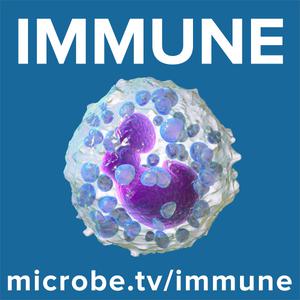 Immune
Immune
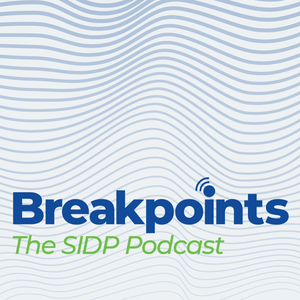 Breakpoints
Breakpoints
 Febrile
Febrile
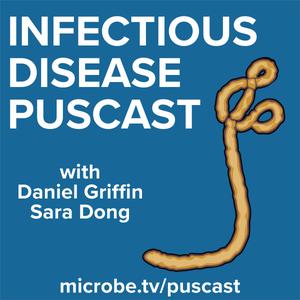 Infectious Disease Puscast
Infectious Disease Puscast
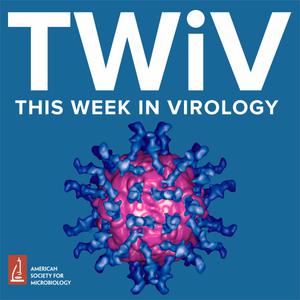 This Week in Virology
This Week in Virology
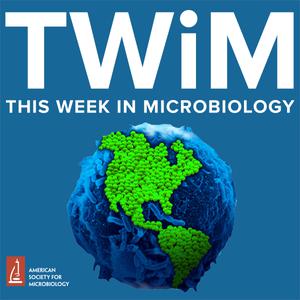 This Week in Microbiology
This Week in Microbiology